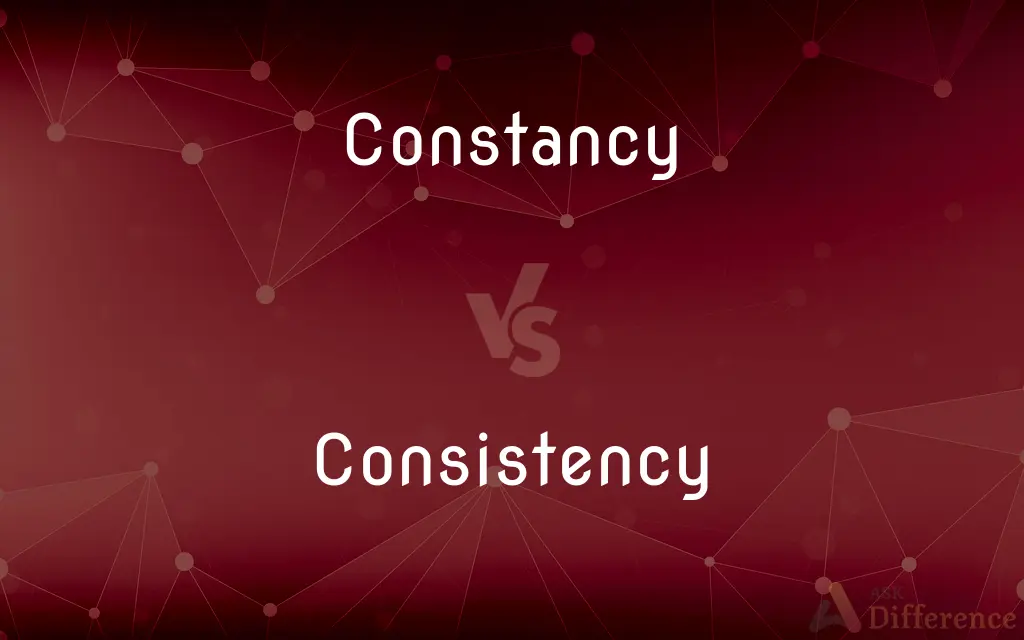Constancy vs. Consistency — What's the Difference?
By Maham Liaqat & Urooj Arif — Updated on March 29, 2024
Constancy refers to the quality of being unchanging or stable, while consistency denotes the adherence to the same principles or course of action over time.

Difference Between Constancy and Consistency
Table of Contents
ADVERTISEMENT
Key Differences
Constancy is a trait that implies steadfastness and a lack of change, highlighting the unchanging nature of an individual's character, feelings, or loyalty. It emphasizes stability and permanence in emotional or relational contexts. On the other hand, consistency relates to uniformity in actions, behaviors, or performance, suggesting a reliability that comes from following the same patterns or standards over time.
In terms of personal development, constancy might be seen in one’s steadfast adherence to values or beliefs regardless of external changes. This kind of emotional or psychological stability is crucial for personal identity and relationships. Conversely, consistency is key to building habits, achieving goals, and developing skills, as it refers to the regularity of actions and the gradual improvement over time.
From a professional perspective, a company may be praised for the constancy of its mission and core values, which remain unchanged over the years, providing a solid foundation for its identity. Consistency, however, is more about the company's performance, quality of service, or product delivery, which needs to be reliable over time to build trust with customers and stakeholders.
Striking a balance between constancy and consistency is essential in various aspects of life. While constancy provides a stable core of values and feelings, consistency ensures that actions and behaviors align with these principles, leading to growth and reliability.
Comparison Chart
Definition
Quality of being unchanging or stable.
Adherence to the same principles or course of action.
ADVERTISEMENT
Emphasis
Stability and permanence in emotional or relational contexts.
Uniformity in actions, behaviors, or performance.
Application
Seen in steadfast loyalty or an unchanging state.
Observed in repeated actions leading to predictable outcomes.
Connotation
Emotional or qualitative.
Quantitative, often measured in practices and results.
Importance
Crucial for personal identity and relationships.
Key to building habits, achieving goals, and skill development.
Compare with Definitions
Constancy
Loyalty.
Constancy in love is admired in romantic relationships.
Consistency
Achievement of Goals.
It's the consistency of effort, not intensity, that matters most.
Constancy
Unchanging Nature.
The constancy of his principles made him a reliable leader.
Consistency
Regular Performance.
Her consistency in training led to winning the championship.
Constancy
Permanent State.
The constancy of the northern star has guided sailors for centuries.
Consistency
Habit Building.
Daily consistency in practicing the piano improves skills over time.
Constancy
Emotional Stability.
Her constancy in friendship provided a sense of security.
Consistency
Uniformity in Actions.
The consistency in product quality boosted customer trust.
Constancy
Steadfastness.
His constancy in adversity was truly remarkable.
Consistency
In classical deductive logic, a consistent theory is one that does not lead to a logical contradiction. The lack of contradiction can be defined in either semantic or syntactic terms.
Constancy
Steadfastness, as in purpose or affection; faithfulness.
Consistency
Consistent behaviour or treatment
The consistency of measurement techniques
Constancy
The condition or quality of being constant; changelessness.
Consistency
The way in which a substance holds together; thickness or viscosity
The sauce has the consistency of creamed butter
Constancy
(uncountable) The quality of being constant; steadiness or faithfulness in action, affections, purpose, etc.
Consistency
Agreement or logical coherence among things or parts
A rambling argument that lacked any consistency.
Constancy
(countable) An unchanging quality or characteristic of a person or thing.
Consistency
Correspondence among related aspects; compatibility
Questioned the consistency of the administration's actions with its stated policy.
Constancy
The state or quality of being constant or steadfast; freedom from change; stability; fixedness; immutability; as, the constancy of God in his nature and attributes.
Consistency
Reliability or uniformity of successive results or events
Pitched with remarkable consistency throughout the season.
Constancy
Fixedness or firmness of mind; persevering resolution; especially, firmness of mind under sufferings, steadiness in attachments, or perseverance in enterprise; stability; fidelity.
A fellow of plain uncoined constancy.
Constancy and contempt of danger.
Consistency
Degree of density, firmness, or viscosity
Beat the mixture to the consistency of soft butter.
Constancy
The quality of being free from change or variation
Consistency
Local coherence.
Constancy
The tendency for perceived objects to give rise to very similar perceptual experiences in spite of wide variations in the conditions of observation
Consistency
Correspondence or compatibility.
Consistency
Reliability or uniformity; the quality of being consistent.
They want to achieve a high degree of consistency in their process and their product.
Consistency
The degree of viscosity of something.
Mix it until it has the consistency of a thick paste.
Consistency
(logic) Freedom from contradiction; the state of a system of axioms such that none of the propositions deduced from them are mutually contradictory.
Consistency
(obsolete) Firmness of constitution or character; substantiality; durability; persistency.
Consistency
The property of holding together and retaining its shape;
When the dough has enough consistency it is ready to bake
Consistency
A harmonious uniformity or agreement among things or parts
Consistency
Logical coherence and accordance with the facts;
A rambling argument that lacked any consistency
Consistency
(logic) an attribute of a logical system that is so constituted that none of the propositions deducible from the axioms contradict one another
Common Curiosities
Is constancy always a positive trait?
While often seen positively, constancy can be negative if it means stubbornness or resistance to necessary change.
Can a person be consistent but not constant?
Yes, someone can perform actions consistently (like regularly exercising) without being constant in their emotional states or beliefs.
How does consistency contribute to professional success?
Consistency in performance and quality of work leads to reliability, trustworthiness, and eventually, professional success.
How does one achieve consistency in personal habits?
Achieving consistency requires setting clear goals, establishing routines, and practicing discipline.
How do cultural perceptions of constancy and consistency vary?
Cultural values may prioritize one over the other, influencing how traits like loyalty, reliability, and work ethic are viewed.
How do constancy and consistency differ in a relationship context?
Constancy refers to unwavering loyalty and emotional stability, whereas consistency involves regularly showing care and maintaining effort in the relationship.
Does constancy imply a lack of growth?
Not necessarily. Constancy in values or loyalty doesn't preclude personal or professional growth; it provides a stable foundation for it.
How do constancy and consistency relate to personal values?
Personal values inform the constancy of one’s beliefs and the consistency of actions aligned with those beliefs.
Why is consistency important in learning new skills?
Consistency allows for gradual improvement and the reinforcement of learning, making skill acquisition more effective.
Is it possible to improve constancy in one’s life?
Yes, by cultivating mindfulness and reflecting on core values, one can enhance emotional stability and constancy.
Can a company exhibit both constancy and consistency?
Yes, a company can uphold the constancy of its core values while consistently delivering high-quality products or services.
Can constancy affect one's mental health?
Yes, constancy in emotional support and relationships can positively impact mental health by providing stability and security.
Can technological advancements influence constancy and consistency?
Yes, technology can offer tools for maintaining consistency in tasks and communications, while also challenging constancy through rapid change.
How do constancy and consistency impact teamwork?
Constancy in commitment and trust within the team fosters a stable environment, while consistency in contributions and effort ensures team objectives are met.
What role does leadership play in promoting constancy and consistency?
Effective leadership exemplifies constancy in vision and values, while also driving consistency in standards, practices, and goals.
Share Your Discovery

Previous Comparison
Posterior vs. Postilion
Next Comparison
Catharsis vs. CatalystAuthor Spotlight
Written by
Maham LiaqatCo-written by
Urooj ArifUrooj is a skilled content writer at Ask Difference, known for her exceptional ability to simplify complex topics into engaging and informative content. With a passion for research and a flair for clear, concise writing, she consistently delivers articles that resonate with our diverse audience.
















































